- Home
- Dornford Yates
Valerie French (1923) Page 18
Valerie French (1923) Read online
Page 18
"I believe," said the knight, "it's a woman. Happily for us both, I've never seen her; but when the Census was taken, her sex appeared on some paper I had to sign. We get on very well. I pay her as she likes to be paid, and she feeds me as I like to be fed. But to return to your niece. Why does she make this ridiculous stipulation?"
"Does she?"
"That's what it amounts to. Lyveden's a fool, of course. If he wasn't— he’d snuff it out. But, so far as marriage is concerned, his mind's diseased. Instead of demanding performance, he desires to gratify her whim. He recognizes this caprice, dignifies it, confers upon it the rank of a condition— a condition precedent."
"Has he said so?"
"Virtually. He fenced, of course, but his— er— his handicap's about forty-five."
Lady Touchstone laughed. Then she knitted her brow.
"Don't think too hardly of Valerie, and don't despise her squire. They're a remarkable pair. Anthony's desperately honest, and his judgment is sound. Valerie, I want you to meet. She's not only astoundingly lovely, but she has a clearer brain than almost any woman I've ever known. As for her honesty— well, she's a glaring exception to the rule. Her handicap is about the same as yours. They've both suffered most heavily by no fault of their own. They were made for each other, and if they were parted to-morrow for good and all, neither the one nor the other would ever so much as look upon anyone else. I know you mock at love, so I won't refer to it again, but I tell you we're dealing here with something which is above contracts, which no man-made canons can touch. Two perfect, gentle specimens of the human race have been brought together: as one who is interested in humanity, surely you must desire their permanent union."
"Madam," replied Sir Andrew, speaking with considerable warmth, "I do nothing of the sort. But for the fact that a marriage has been arranged, I should seek to prevent my secretary from committing an unwarrantable act of folly which he will live to regret. Since, however, the bargain has already been struck, I am ready to do what I can to compass its execution."
"Your choice of words," said Lady Touchstone, "suggests a hideous comparison. I believe you think all marriages should be solemnized upon the scaffold, and that, when sentence has been passed, some official should bawl, 'So perish all idiots.'"
Sir Andrew shifted uneasily, forgetting his injured knee. The squeal of agony with which he repaired the omission sent his guest's heart into her mouth.
"Oh, what have I said?" she wailed. "What have I said? I assure you—"
"Nothing!" shouted her host. "Nothing at all. I— I beg your pardon." With a shaking finger he indicated the offending joint. "This blasted knee, madam, is enough to drive me mad. I loathe and detest inaction. I hate being girded and carried before my time. Yet if I so much as move..."
He let the sentence go and flung himself back in his chair like a petulant child.
Lady Touchstone was by his side, and her hand on his arm.
"I am so awfully sorry. I know so well what it means. But please try to remember that now you're in Nature's hands. Pain's her signal to stop. If you obey her orders, she treats you better and quicker than any leech alive."
The giant blinked at the slight, gloved fingers upon his sleeve and, after a little, up into the smiling face.
"You're very gracious," he said humbly.
With a heightened colour, my lady resumed her seat and, the iron being hot, presently beat out a promise that the knight would lie abed for two days.
"Of course," she concluded, "I should never have come to-day. It was very handsome of you and most unselfish. You've deliberately retarded your recovery because you were anxious to help two— two— idiots to their doom."
"I was anxious," replied Sir Andrew, "to have your advice. Now that I have it—"
"What counsel have I bestowed?"
"You have advised me that Miss French is sane, that she desires to be personally remembered, that her desire is just. I honour and accept your advice."
Lady Touchstone smiled.
"It's very nice of you to accept what you do not believe."
Sir Andrew reddened.
"You are more eloquent than you think," he said huskily. "I pray you forget my outburst just now. It was the last, blind rush of the bayed boar."
Lady Touchstone caught her breath.
After a moment the giant continued, frowning.
"I have always looked upon women as an unnecessary evil. My mother I never knew. My father died when I was fourteen. In fourteen years I saw him seven times. I was reared by two aunts, neither of whom was necessary, both of whom were evil. They believed that, but for me, they would have inherited my father's fortune— and used me accordingly. At their hands I endured penal servitude for ten long years.... I have fought shy of women ever since.
"Things sentimental I have always scorned and eschewed. Finding life brief, I sought to eliminate such stuff as weighed nothing. Sentiment stood first upon my list. I judged it idle, an empty toy, froth. When I found it clinging to my sleeve, I tore it off and stamped it under my feet.
"It follows that the love of women seemed to me a very perilous vanity, a snare of the devil himself."
The knight paused and passed a hand across his eyes.
"Well, madam, you and Lyveden have opened my eyes. He has shown me that there is a sentiment which is not sickly, which, sired by honesty, illumines the cold severity of life. You and he have shown me that 'there are more things in heaven and earth than were dreamt of in my philosophy.'"
"I'm— I'm very glad," whispered Lady Touchstone, who was upon the edge of tears. "What— what have I shown you?"
Sir Andrew stared upon the floor.
"You?" he said. "You have shown me that women are not always unnecessary and not necessarily evil."
ONE WEEK had gone halting by.
André Strongi'th'arm had left London: Sir Andrew was walking with a stick: Lady Touchstone was looking tired; Valerie and Anthony Lyveden were the best of friends.
The sky was clear enough, but the atmosphere was unreal. The blue bird was there, but he was off colour.
Looking upon her niece and Anthony, Lady Touchstone felt inclined to scream: looking upon Lady Touchstone, Sir Andrew snorted and blew and, finally, begged her acceptance of a dozen of port.
It was this solicitude for her corporal health which stung the lady into action.
She fell upon Valerie that evening.
"A drink," she said, raising her eyes to heaven. "He actually offers me a drink. It's rather pathetic— like a child pressing a toy upon a woman in tears."
"I hope you'll take it," said Valerie. "I'm sure—"
"I had to give up port," snapped Lady Touchstone, "before you were born. Besides, I don't want booze: I want exercise. Why am I here, in London? The streets are up, and Anthony Lyveden's found. Why on earth don't we get a move on?"
"You mean...?"
"What I say. A move. I don't care what it is. But this appalling inaction is breaking my heart. The play's the thing— not the interval."
"What you really mean," said Valerie, "is that I have provided a ghastly anticlimax. Anthony's entrance was worked up into a perfect sunrise of undreamed-of ecstasy— I worked it up— and, now the millennium's here, we're talking about the weather."
"Let me at once admit," replied her aunt, "that I couldn't have put it so well. Having done that, I feel at liberty to tell you that you ought to be ashamed of yourself."
"But is it my fault, Aunt Harriet? Is it my fault?"
"That the time is out of joint? No. But you alone can reduce the dislocation." Valerie knitted her brows. "Think. What can anyone do except you? How can anyone move until you give the direction? We're all— Sir Andrew included, and Anthony most of all— afraid to breathe, for fear of upsetting the boat. I'm only speaking now because I'm desperate, because I can't sit still and watch us drift and drift...."
"Whither?"
"Who knows? That's the dreadful part of it. We can't see a yard ahead. We may be drif
ting on to rocks or breakers—"
"Or into harbour."
"No," said Lady Touchstone. "And that's the danger. No ship that ever was launched drifted into harbour. You've got to work to get there."
Valerie pondered awhile.
Presently—
"Shall I ask them to come to Bell Hammer?"
"Just as you please. I can't advise you because you've got the chart. But it's a move of some sort, and I’d rather drift at Bell Hammer than drift in Town."
"I'll ask them to-morrow," said Valerie. "I suppose they'll come."
"If they do," said Lady Touchstone, "my doom is sealed. Sir Andrew's trying to decide whether to marry me or no. And when he sees me on the terrace in my grey corduroy, finishing that jumper for Anthony, it'll be all over. But I don't think I can, can I?"
Valerie laughed mischievously.
"I can't advise you," she said, "because you've got the chart." Lady Touchstone choked. "As an uncle, I should be very proud of him. And if, when he loses Anthony and you lose me—"
"Andrew Plague," said her aunt, leaning forward and looking into Valerie's eyes, "is a man of action." She paused. "If he decides to marry me, he will not wait upon 'I would.' And, if I were to reply that I would marry him if— when you and Anthony are wed, he would immediately withdraw his offer. He has no use for contingencies dependent upon the whim of an inscrutable Fate.... Neither have I. When you told Anthony that you would marry him when he remembered you, you did a barbarous thing." Valerie started. "Yes, barbarous. He loved you passionately. He loves you passionately still. Is he to suffer because of his affliction?"
The girl looked away and down, wringing her pointed fingers. The woman lay back in her chair and shaded her eyes. After a moment, she continued to speak— very tenderly.
"The Lord gave his memory. As a little, motherless child, that wonderful spring began to well at the back of his tiny brain. First he remembered little prayers, asking God nightly to 'make him a good boy.' Then he remembered nursery rhymes— immemorial toys and jingles, sacred nonsense. Every book of those rhymes should have a rubric. 'In nurseries and places where they lisp, here followeth the Anthem.' Well, that wonderful spring has failed. That abundant, refreshing fountain, in which we go and plunge our tired minds a hundred times an hour, has been dried up. The Lord gave, and the Lord hath taken away. Don't think I'm being harsh. I understand. But, Valerie, unless you can say to yourself, 'I don't love him'—"
"I do!" wailed Valerie. "I do! But..."
"— unless you can say, 'I know I can't make him happy,' unless you can say, 'I believe he will make me unhappy,' it is your bounden duty, after all that has passed, to take that condition back. Think. If he had no sight, wouldn't you give him your eyes? And thank the good God for the blessed privilege? Of course you would. Then let him share your memory. Make him free of your beautiful fountain, and let him bathe his poor, tired brain. When I think of that poor, dear fellow, straining heart and soul, for love of you, to wring a favour out of the fist of Fate—"
"Don't, don't!" cried Valerie, lifting her head. "Don't whip me any more. I never meant to be cruel." She fell on her knees and buried her face in Lady Touchstone's lap. "I love every hair of his head. I’d give him my soul to-morrow— you know I would. If he was ill, and it would help him, they should bleed me white. And you know how little I’d care about his memory if only it— really— was— dead."
"'Vanity of vanities,'" said Lady Touchstone sadly. "'All is vanity.' Don't think I'm lecturing. I'm crying— in the wilderness. Vanity's the terrible freemasonry to which all women subscribe. If I were a man, perhaps I could argue with you. But now you've made me a sign— you've invoked our tacit, cursed sisterhood, and, because I was born a woman, you've shut my mouth."
Valerie looked up into the other's face.
"I'm glad," she said gently, "I'm glad you understand.... For now, when I marry Anthony, as I shall— if he'll take me— within the month, it'll be the greatest comfort in all the world to know that you're there— at my shoulder, that you've got a smile for me, which he can't fathom, that, no matter what's written, you'll always be able to read between the lines."
Lady Touchstone wept.
Presently she smiled through her tears.
"I might be your sister, Valerie."
Her niece put her arms about her neck.
"Dear Harriet," she said, and kissed her.
Lady Touchstone closed her eyes and blessed God.
PATCH was plainly delighted to see Bell Hammer again, and when he found his log in its proper place he lifted up his voice in heartfelt gratitude.
Anthony watched his excitement with hungry eyes.
He supposed that the log was a toy and, as such, kept for the terrier in the bedroom which he had used; and the dog remembered his plaything as a matter of course, and—
Here the billet was brought and laid at Anthony's feet. Two bright, brown eyes stared up expectantly into his: a short, white tail moved slowly to and fro. Clearly the game was waiting, and he— he had forgotten the rules....
Lyveden stooped and caressed the eager head.
"Not to-day, old chap," he said gently. "To-morrow, perhaps. Or— or the day after."
The man was not unhappy. At times he was radiant. After all, as lovers go, he was unearthly rich. He had been given the very fee simple of Paradise itself. True, the estate was in trust, but one day the trust would be broken and he would enter in ... one day....
Till then— well, he was very lucky: he had much to be thankful for. A serious flaw in his title had been done away. He was, so to speak, in the straight. He would, of course, have liked to be able to see the post— have some sort of idea how long the straight was. Still...
Valerie was very sweet— very. No one could have been sweeter. He was most awfully proud of her. And— and she was splendid company....
Company. The word seared his brain. His wonderful, peerless shepherdess— his queen— his darling ... was an excellent pal— pal. Yes, that was it— pal. Hell, how he loathed the word! Pal.... More. The bower had been rearranged— turned into a lounge, a parlour.... Arcadia had been converted into a recreation-ground.... And Love— Love had been decently clothed in a coat and trousers, with a nice, fat gag in his mouth and cuffs on his little pink wrists.... The exquisite masterpiece was gone, and a vulgar parody hung in its sacred room.
Anthony groaned.
It was not that he wanted to sit in the shade of an oak and sigh all day into a reed; it was not that he wanted to lie at the feet of Amaryllis, setting her brows to music and calling the heaven to wonder at her soft, dark hair. He wanted to take her hand and run down the dewy glades: he wanted to lift her to pick the dangling fruit— to stand with her on the hill-top and watch the sun get up, mark the breath of her nostrils upon the evening air, plunge with her into the horseplay of the wind: he wanted to hear the woods give back their laughter: he wanted to know that Love was enlarged, free— free to look out of her eyes, free to float upon her voice, free to sit upon his shoulders and flash in her smile....
Lyveden pulled himself together, wrenched his mind out of this perilous groove and tried to thank his stars for providing such a nice recreation-ground. It was vital that he should not lose heart— vital. So long as he did not lose heart, he had the ring on his finger ... the magic ring which, when he had found the trick of it, would turn the recreation-ground into the Garden of Eden.
Then he sat down on his bed and racked his brain until his head ached....
SIX HOURS had passed by.
Valerie, her aunt, and Sir Andrew had retired, and Lyveden and Patch were sharing the library fire.
This was too good to be left.
Most of the logs had melted into a quilt of red-grey ash, and such as were still surviving had become mere rosy brands, which winked and glowed silently and, from time to time, settled peacefully into their feathery grave.
The Sealyham was lying on his side before the hearth. Anthony was sitting on a corner of the
broad club-kerb, smoking lazily and remarking the silence of the country with grateful ears. He enjoyed it amazingly, this peace. To listen, with windows open, and hear no sound, save the deliberate movement of a grave-faced clock, was fascinating....
A tall door opened, and Valerie came in.
Patch started up, and Anthony got upon his feet.
"And why," said the girl, advancing, "aren't you in bed? You're tired. You admitted you were. Yet you sit up."
"It's a way children have," said Anthony. "I'm so pleased with the pretty fire my hostess gave me. And I'm not at all sure that isn't why you've come back. I thought you looked at it longingly when you went— to bed."
"As a matter of fact," said Valerie, stooping to stroke the terrier, "I came to see you."
"You're a brilliant hostess," said Anthony, "but an unjust judge. You blame me for sitting up, and then deliberately incite me to repeat the offence."
Valerie laughed.
"It's a way women have," she said.
With that, she stepped over the Sealyham and took her seat on the kerb. Anthony resumed his, and, having knocked out his pipe, stretched up his hand and set it upon the broad stone mantelpiece. Then he folded his arms and looked at the beautiful face four feet away.
Valerie stared, smiling, into the fire.
Miss French was one of those women who are full of natural grace. She never took thought how she should sit or stand, but she never assumed an unbecoming pose. As a Naiad should sit by a fountain, so sat Valerie by that wood fire.
Her turned, down-looking head gave you her lovely profile— straight nose, proud, sensitive mouth, delicate chin. The column of her neck rose, white and gleaming, from the broad mouth of her dress. This was simple— a rich, plain purple— low-waisted, sleeveless, admirably cut, with points touching the ground. Black satin shoes, black stockings enhanced the beauty they shod. She sat sideways, straight-backed, much as a woman sits upon a horse. Her small, firm hands were folded upon her thigh. The toe of one little slipper rested upon the floor: the other lay close, braced against the silk of her stocking, four inches below the knee.

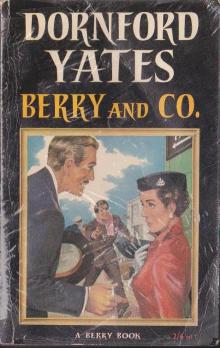 Berry and Co.
Berry and Co.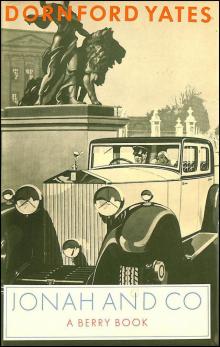 Jonah and Co.
Jonah and Co.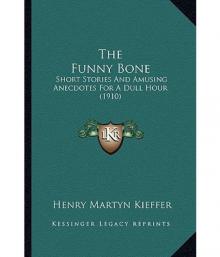 The Funny Bone: Short Stories and Amusing Anecdotes for a Dull Hour
The Funny Bone: Short Stories and Amusing Anecdotes for a Dull Hour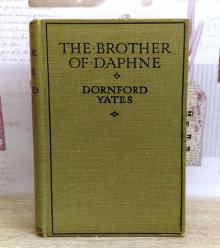 The Brother of Daphne
The Brother of Daphne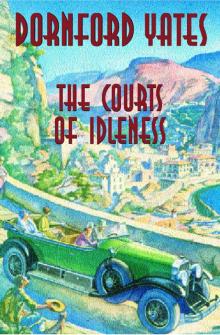 Courts of Idleness
Courts of Idleness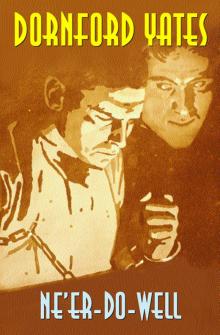 Ne'er Do Well
Ne'er Do Well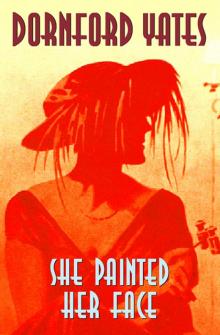 She Painted Her Face
She Painted Her Face Safe Custody and Laughing Bacchante
Safe Custody and Laughing Bacchante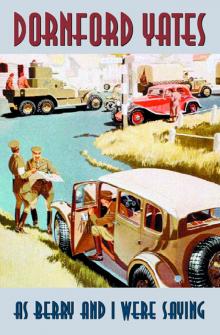 As Berry and I Were Saying
As Berry and I Were Saying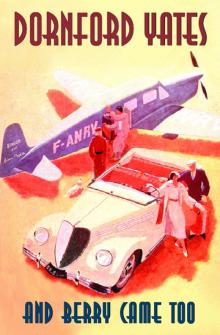 And Berry Came Too
And Berry Came Too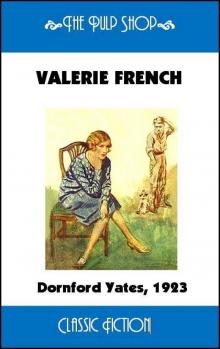 Valerie French (1923)
Valerie French (1923)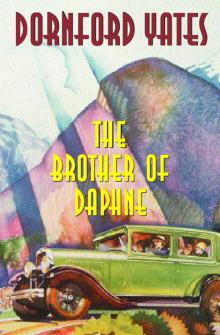 Brother of Daphne
Brother of Daphne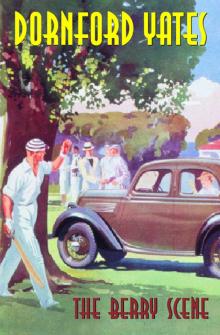 Berry Scene
Berry Scene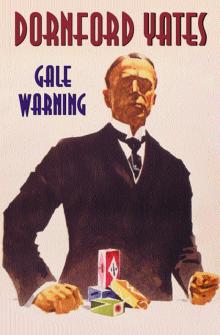 Gale Warning
Gale Warning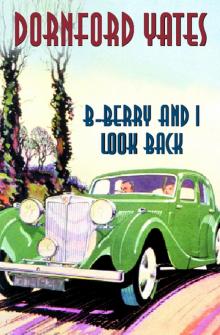 B-Berry and I Look Back
B-Berry and I Look Back Storm Music (1934)
Storm Music (1934)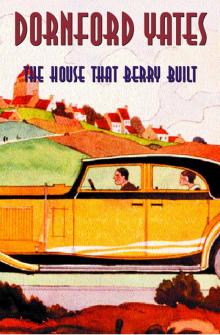 House That Berry Built
House That Berry Built